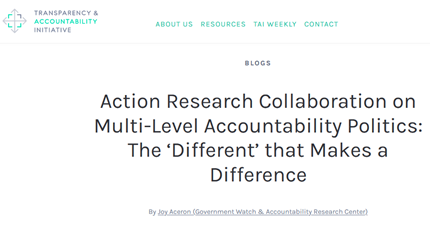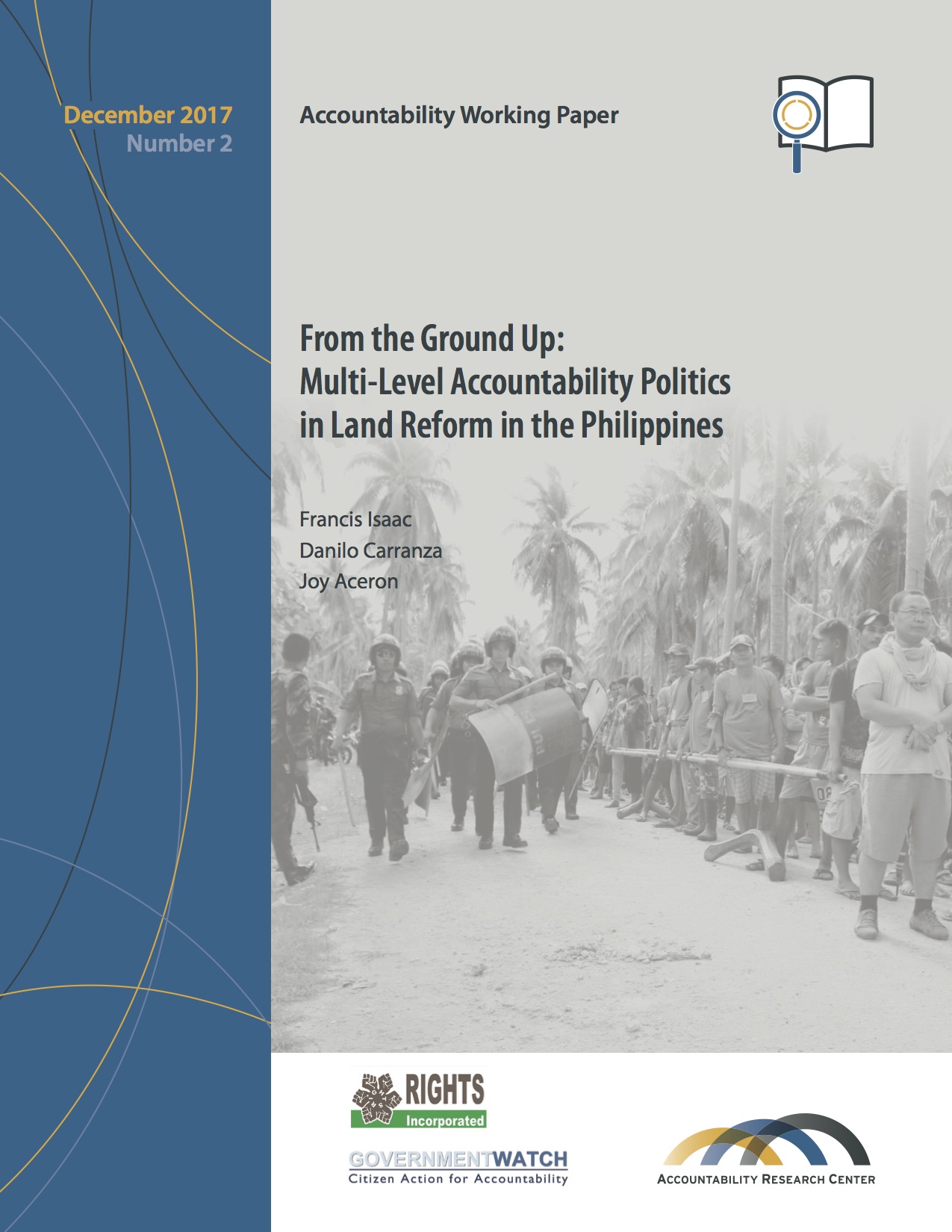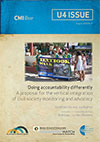
Action Research Collaboration on Multi-Level Accountability Politics: The ‘Different’ that Makes a Difference
Date: April 2021
Author(s): Joy Aceron
Publication type: Blog
Published by: Transparency & Accountability Initiative (TAI)
With the COVID-19 crisis getting worse in many parts of the globe, it is hard to think and talk about anything else these days. However, the fundamental flaws of politics and society all too apparent amid the pandemic reminds us that the core work we do to address these flaws is just as important. That core challenge is at the heart of the partnership between Government Watch (G-Watch) in the Philippines and the Accountability Research Center (ARC) in the United States – namely to do transparency, participation, and accountability (TPA) differently. What does that entail?
Making TPA address not just the symptoms of governance problems but the root causes as well, changing who sets the agenda in the TPA field, and how knowledge is produced by whom, when and for whom. We see these agendas as important in sustaining the gains of reforms and change campaigns in politics and governance that matter to people. Key to advancing these agendas is an equitable and balanced way of doing knowledge production between Global North and Global South knowledge producers based from the international down to the grassroots levels.
I was reminded of this essential part of our work as I read the recently-published article by Pat Scheid entitled ‘Building Partnerships Based on Trust: Q&A with ARC and CEGSS,’ where she interviewed colleagues from ARC Naomi Hossain and from CEGGS Walter Flores and Benilda Batzin. Their conversation shares key differences in the way knowledge partnerships are being created and honed by ARC.
In the TPA field, much of the debate involves how external actors could and should promote more effective interventions or how to induce civic engagement “from above.” Yet for all the talk about the need for “local ownership,” this debate has yet to go into “listening mode,” to learn from strategists in the Global South who are promoting accountability campaigns that are already grounded in broad-based civic organizations and social movements.
It is important that development actors from the Global North listen to and support the action strategists who are making social and political change in the Global South. Our action research collaborations are premised on solidarity and balanced partnership in thinking about and doing accountability that involves multi-level knowledge building and learning. It recognizes that no one has a monopoly on knowledge while being mindful of the asymmetry in capacity and resources between the Global North and the Global South, and between actors at different levels, that requires a deliberate effort to level the playing field.
I want to highlight three key points from an analysis of the land reform campaign by the Peasant Movement of Bondoc Peninsula (Kilusang Magbubukid ng Bondoc Peninsula, KMBP) and RIGHTS Network and their struggle for land rights.
1. The campaign was led by mass membership organizations of peasants that took years of community organizing to build – and to withstand backlash.
The long campaign for agrarian reform in the Philippines has largely been led by peasant organizations with deep links to the democracy movement. Following the transition from martial law to electoral politics in 1986, a broad coalition of peasant organizations and their allies secured legislation for agrarian reform and, in 1988, a land redistribution policy known as the Comprehensive Agrarian Reform Program. Yet, landlord power and impunity slowed implementation. For decades, the peasant movement struggled to push the government to implement its own laws, which involved direct conflict with landlords and their allies in government.
In Bondoc Peninsula, the peasant-led campaign eventually led to the transfer of 10,000 hectares of land from some of the biggest landlords in the area to 3,800 peasants. This campaign centered on peasant needs and demands, and the strategy it employed was designed and orchestrated by the peasants themselves, alongside allies at the national level. The NGO that assisted the farmers in organizing, mobilizing, and strategizing – RIGHTS Network – was led by farmer-leaders and peasant organizers who have been at the forefront of agrarian reform advocacy from the start. The thinkers and movers of the campaign were the people who were affected by the issue; although they had many allies, including international groups and researchers, the campaign was people-led, people-owned, and people-centered. Even when it comes to highly complex campaigns or struggles involving the most powerful forces, there is an organic capacity and knowledge on the ground that can be tapped to propel a campaign to victory. External actors may extend support, but that is best done by letting those on the ground to determine how, where and when support is needed.
2. The campaign aimed to achieve a change agenda to transform the lives of the peasants, using a multi-faceted strategy.
The KMBP struggle aimed to achieve the difficult goal of “giving land to the tillers” in a country where elite control of land has been the long-standing approach to concentrating economic and political power in the hands of a few. Peasant organizations built their campaign from the ground up, starting around particular villages and landholdings, and then formed coalitions operating at the municipal, district, and national levels. This allowed peasants to exert pressure on different levels of government, at times aided by national-level civil society organizations and media coverage. Today, the campaign continues, evolving with the aim of achieving the ultimate goal of land reform – emancipation from poverty.
3. The change strategy involved power shifts and anticipated responses of anti-accountability forces at multiple levels.
Government will not always willingly implement its own laws and policies, especially if powerful interests are involved. Often, those that are passed over are those that make a real difference in the lives of the people. The KMBP case sheds light on how direct pressure from citizens can promote responsive and accountable policy-making and governance in such instances. The contestation between forces that aim for implementation (pro-accountability forces) and those that seek to hinder it (anti-accountability forces) are what ARC’s Jonathan Fox refers to as “accountability politics”.
The KMBP case shows how the multi-level, vertically-integrated action of the peasant movement was necessitated by the similarly multi-level, vertically-integrated action of the landlords and their allies in undermining reform implementation – using harassment, physical violence, vote buying and political maneuvering. Such elite tactics were responded to with people power at a scale that enabled power shifts towards implementation. These three substantive points were generated through an action research process in which Filipino action-strategists and the campaigners themselves took part in the generation, development and articulation of knowledge in collaboration with an American research center that played the role of a critical friend. The process was not only about learning, but building relationships and alliances as well. The analytical tool that was used, the Expanded Scaling Accountability Mapping Tool (see also this paper) was co-developed and co-applied with the campaigners. It was practical, grounded and synthesizing; it not only facilitated joint analysis of action, it also propelled joint agenda-setting on how the actions can be improved. Such knowledge partnership produced a product that surfaces the necessary complexity of the strategy employed by a citizen campaign. This is useful for campaigners as they reflect on how to evolve approaches going forward. It is also useful for policy actors at the top, who can better understand the demands and support required for citizen campaigns to succeed.
Note: This blog was originally published by Transparency & Accountability Initiative on April 19, 2021.
 Photo Source: The Communication Initiative Network
Photo Source: The Communication Initiative Network
Joy Aceron
Joy Aceron is convenor-director of Government Watch (G-Watch) in the Philippines and an adviser-research affiliate of Accountability Research Center (ARC). She has two decades of experience in citizen engagement in governance, and has several published works on political reform, civil society campaigns and leadership.


